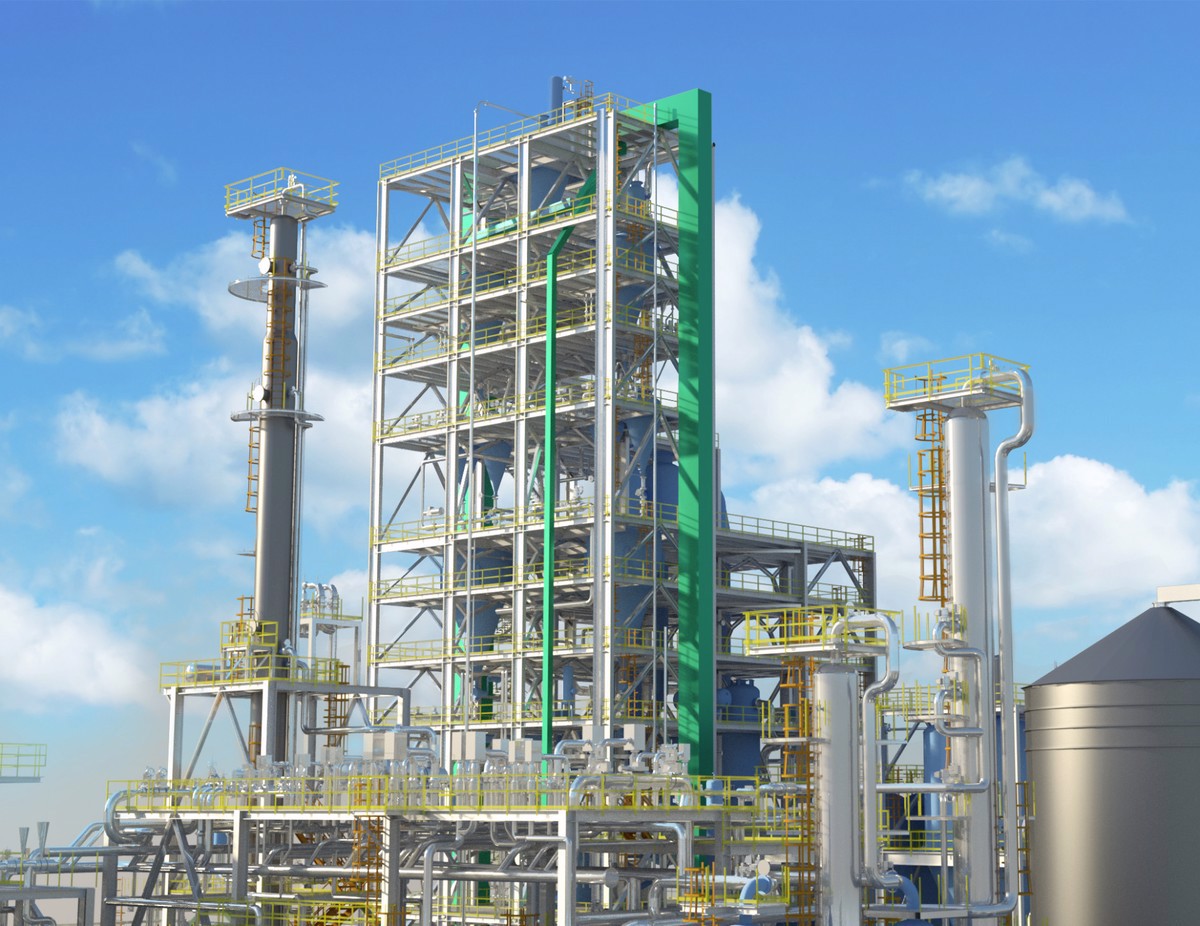The Week in Alternative Fuels
Here are some of the key developments in alternative bunker fuels from the past week.
 PHOTO: A proposed model of Gidara's Advance Methanol Rotterdam facility. Gidara
PHOTO: A proposed model of Gidara's Advance Methanol Rotterdam facility. Gidara
The world’s first pure battery-powered bunker tanker, the Asahi, completed its first bunker delivery on Tuesday.
Norway’s hydrogen bunkering company Hyon has partnered with Gen2 Energy and ASCO Norway to develop a hydrogen hub for maritime transport in the country's northern Nordland region.
Scandinavia’s Port of Gothenburg has set out to offer e-methanol STS bunkering by 2024, targeting demand from methanol-powered vessels expected to be deployed by major shipping lines over the coming years.
Gidara's Advance Methanol Rotterdam facility (AMR) is expected to produce 90,000 mt of bio-methanol annually by using non-recyclable waste as feedstock.
Nordic gas supplier Gasum will expand its LNG bunker supply network to Zeebrugge and possibly other Belgian ports after being awarded a bunker licence.
The Port of Rotterdam aims to become Europe's clean energy by setting up green hydrogen factories and four electrolysers in the coming years, the city of Rotterdam's vice-major Arno Bonte said.
Norwegian ship designer Ulstein has come up with a nuclear-powered expedition cruise vessel that features a nuclear Thorium Molten Salt Reactor (MSR).
Japanese engineering company JGC has partnered with Toyo Engineering to grow its ammonia plant business amid prospects of strong demand from shipping and other industries.
After a successful pilot trial with the liquid hydrogen carrier Suiso Frontier, Kawasaki Heavy Industries has put forward a plan to build a liquified hydrogen carrier with four 40,000 cbm-capacity carrying tanks.
The Cruise Lines International Association (CLIA) urged cruise ports to roll out shore power facilities by 2035 to cut emissions for ships while at berth.
Japanese technology company Eco Marine Power has designed a zero emission Handymax bulker, which will use renewable energy, energy saving devices, electric propulsion and fuel cells to curb emissions.
Here are the top five stories in alternative fuels this week:
World's first electric bunker delivers stem
The world’s first pure battery tanker Asahi completed its first bunker delivery on Tuesday.
It supplied fuel to Mitsui O.S.K. Lines’ (MOL) car carrier Victorious Ace at the Daikoku Pier C-1 Wharf in Yokohama, Japan.
Large-capacity lithium-ion batteries power the tanker, which does not emit any greenhouse gases (GHG), a joint statement from the MOL and Asahi Tanker says.
Norway’s Hyon partners with two firms to develop hydrogen hub shipping
Norway’s hydrogen bunkering company Hyon has partnered with Gen2 Energy and ASCO Norway to develop a hydrogen hub for maritime transport in Nordland.
The trio have sought soft funding from Enova for the project called the Green Artic HyHub, which would enable large scale production of compressed hydrogen in Mosjøen and bunkering sites.
The facility will supply hydrogen to vessels in Sandnessjøen and Mosjøen ports.
Gen2 Energy will set up the green hydrogen plant with a production capacity of 15,250 mt/year. With suppliers’ collaboration it will also develop 20/40 feet containers for fuelling or swapping.
Gothenburg to offer e-methanol STS bunkering by 2024
The Gothenburg Port Authority has got its operating guidelines for methanol ship-to-ship (STS) bunkering approved by the Swedish Transport Agency.
The port authority says the approval was a mere formality as vessels have already bunkered methanol by truck in the port for years, starting with Stena Line's cruiseferry Stena Germanica in 2015.
Gothenburg is targeting demand from shipping lines such as Maersk and X-Press Feeders which have been among the first-movers for methanol-powered vessels.
Combined, Maersk and X-Press Feeders are set to operate around 20 methanol-powered containerships by the middle of the decade.
Gidara to establish bio-methanol plant in Rotterdam, targeting demand from shipping and other sectors
Advance Methanol Rotterdam facility (AMR) is expected to produce 90,000 mt of bio-methanol annually by using non-recyclable waste as feedstock.
Dutch biofuel firm plans to build the facility in Torontostraat in Port of Rotterdam.
Gidara has identified FinCo Fuel as a potential buyer, which says bio-methanol produced at AMR can replace diesel and fuel oil in the shipping industry.
Gidara will apply its patented High-Temperature Winkler technology to convert waste into advance biofuels. The design of the facility will be based on the Advance Methanol Amsterdam facility which was announced last year.
Construction is expected to start next year and production from 2025.
Gasum gets LNG bunker licence for Belgium
Nordic gas supplier Gasum will expand its LNG bunker supply network to Zeebrugge and possibly other Belgian ports after being awarded a bunker licence
It points to a growing number of LNG-fuelled car and truck carrier vessels and several of these calling at Zeebrugge.
“…the significance of the ARA region and Zeebrugge as a bunkering hub is likely to increase, which makes it a strategically important area for Gasum,” Gasum vice president Jacob Granqvist says.






